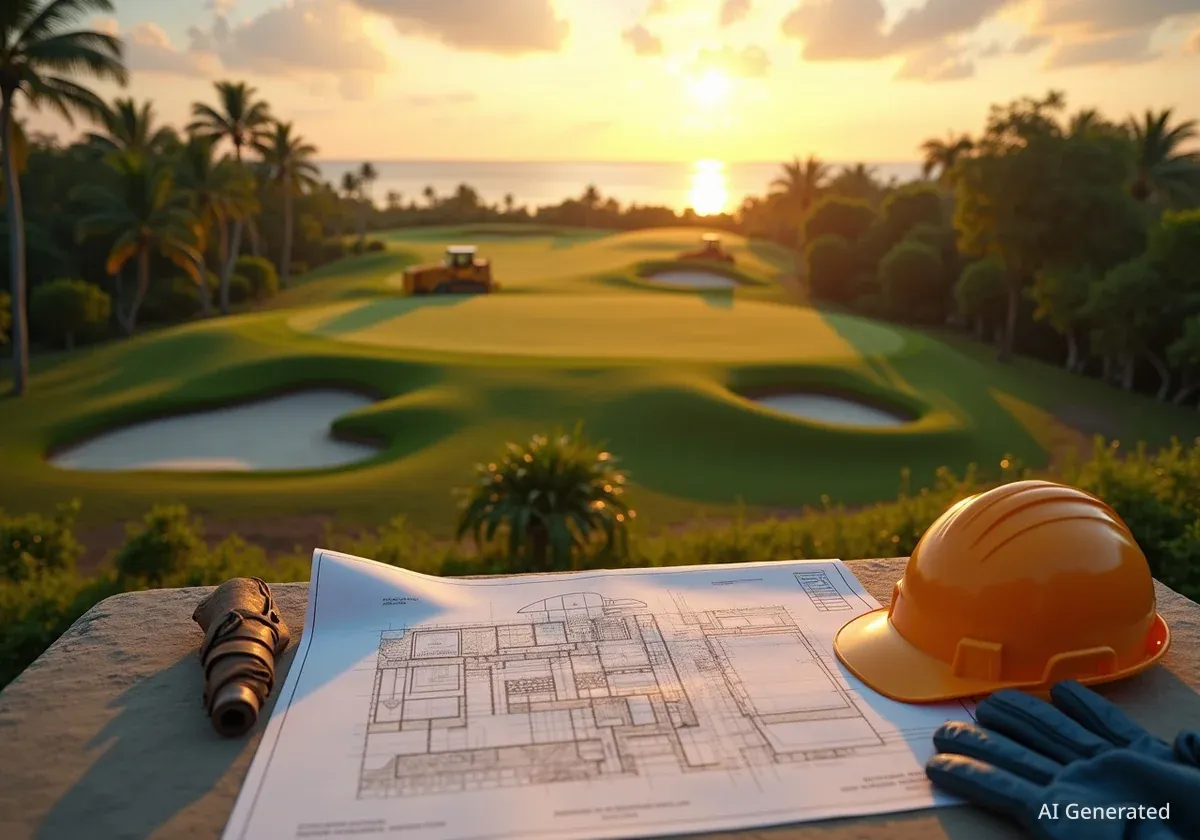A new $1.5 billion luxury development in Vietnam, backed by the Trump Organization and Vietnamese real estate developer Dang Thanh Tam, is moving forward. The project, named Trump International Hung Yen, highlights a business relationship influenced by global trade policies and represents a significant investment in Vietnam's growing luxury market.
The partnership comes as Dang Thanh Tam's company, Kinh Bac City, continues to navigate the economic landscape shaped by U.S. trade relations. The project includes a luxury hotel, villas, and two golf courses, signaling a major venture for both parties in Southeast Asia.
Key Takeaways
- The Trump Organization and Vietnamese developer Dang Thanh Tam's Kinh Bac City are developing the $1.5 billion Trump International Hung Yen project.
- The development includes a 5-star hotel, luxury villas, and two golf courses on nearly 2,500 acres south of Hanoi.
- Dang Thanh Tam's industrial park business previously benefited from U.S. trade policies that shifted manufacturing from China to Vietnam.
- The Trump Organization received $5 million in licensing fees for the project, according to financial disclosures.
- The project's groundbreaking occurred amid new U.S. tariffs on Vietnamese imports, underscoring the complex relationship between the business deal and international trade policy.
A High-Profile Partnership in Vietnam
In May, Eric Trump, executive vice president of the Trump Organization, attended a groundbreaking ceremony for the Trump International Hung Yen. The event, held 37 miles south of Hanoi, marked the official start of the ambitious real estate project. Vietnam's prime minister, Pham Minh Chinh, was also in attendance.
The agreement was formally signed in New York in September of the previous year. According to Donald Trump's financial disclosures filed in June, Dang's firm has already paid the Trump Organization $5 million in licensing fees for the use of the Trump brand.
"This project is more than a development," Eric Trump stated at the ceremony. "It’s a commitment to excellence, a celebration of culture and a lasting investment in Vietnam’s future."
The development is set to cover nearly 2,500 acres and will feature a luxury hotel, high-end villas, and two golf courses. The courses are being designed by professional golfer Bryson DeChambeau, a two-time U.S. Open champion.
The Developer Behind the Deal
The Vietnamese partner in this venture is Dang Thanh Tam, a 61-year-old entrepreneur who has built a significant fortune in real estate. His primary business, Kinh Bac City (KBC), develops industrial parks that host major international manufacturers.
Dang's business trajectory has been marked by both rapid growth and significant challenges. He founded Kinh Bac City in 2002, capitalizing on Vietnam's increasing openness to global markets. The company attracted major tenants like Foxconn, Canon, and LG to its industrial parks.
From Near Collapse to Recovery
After taking Kinh Bac City public in 2007, Dang expanded aggressively by investing in banking and mining, accumulating substantial debt. When interest rates rose sharply in 2011, his business empire faced collapse. By 2013, the company's debt reached $360 million. Dang spent years restructuring and divesting from non-core assets to stabilize the company.
A major turning point came during Donald Trump's first presidential term. The U.S.-China trade war prompted many manufacturers to move operations from China to other countries, including Vietnam, to avoid American tariffs. This shift directly benefited Dang's industrial parks.
Economic Impact of Trade Shifts
The relocation of manufacturing facilities provided a significant boost to Kinh Bac City. According to reports, Vietnamese exports to the United States increased by 119% between 2017 and the end of 2021. During that same period, Kinh Bac City's revenues grew by 161% and its net income rose by 54%.
Today, Kinh Bac City manages nearly 20,000 acres of industrial and residential land. The company's tenants are primarily from China, Hong Kong, Japan, South Korea, and Taiwan, with most of their exported products destined for the U.S. market.
U.S. Market Dominance
The United States is Vietnam's largest export market, receiving nearly 30% of the country's total export turnover. High-tech electronics and consumer goods assembled in industrial parks like those operated by Kinh Bac City are predominantly shipped to the U.S.
Navigating New Trade Policies
The business environment has remained dynamic. In April, the Trump administration announced a 46% tariff on Vietnamese imports. Following the announcement, Kinh Bac City's stock price fell by 27%. However, the groundbreaking for the Trump-branded resort in May served as a visible sign of Dang's connection to the Trump family.
Dang commented on the selection of his partner in an email to Forbes. "We first engaged with Eric Trump through our international network. The Trump Organization conducted strict background checks on me to ensure I was clean—no laundering, no blacklists. That diligence impressed me," he said. "We considered other partners, but Trump’s global brand, luxury expertise, and belief in Vietnam’s long-term potential aligned best with our aspirations."
By July, trade relations saw another shift when a new deal was announced, reducing the tariff on many Vietnamese goods to 20%. Goods determined to be "transshipped" from other countries like China through Vietnam would face a higher 40% tariff. Following these developments and approvals for new industrial parks, Kinh Bac's stock recovered.
"The tariffs introduced under the Trump administration created short-term uncertainty but also accelerated global supply chain shifts. For Vietnam, this was a structural opportunity," Dang stated.
A Life Shaped by Vietnam's History
Born in 1964 in Haiphong, North Vietnam, Dang Thanh Tam's early life was set against the backdrop of the Vietnam War. He later studied marine engineering, law, and business in Vietnam before pursuing further education in the U.K. and Australia. He returned to Vietnam in 1988 and worked for a shipping company, an experience he credits with giving him a global perspective.
In 1996, he and his older sister, Dang Thi Hoang Yen, established their first industrial park. He founded Kinh Bac City on his own in 2002. One of his early successes was convincing Canon to establish a facility in his first park in Bac Ninh province in 2003.
A pivotal moment came in 2006 when he met Terry Gou, the billionaire founder of Foxconn. This meeting led to Foxconn becoming a key tenant in 2007, a relationship that continues today. The same year, Dang took Kinh Bac City public, becoming Vietnam's richest person at the time with a fortune of nearly $400 million.
Future of Manufacturing in Vietnam
Vietnam is a central part of the "China plus one" strategy, where companies diversify their supply chains to reduce dependence on a single country. This trend accelerated due to trade tensions and operational disruptions in China during the COVID-19 pandemic.
- Proximity to China: Kinh Bac's industrial parks in northern Vietnam are close to China's manufacturing centers, allowing companies to source components easily.
- Major Tech Production: Foxconn has invested billions to expand its facilities in Bac Giang to produce Apple products like iPads and MacBooks.
- Apple's Supply Chain: Vietnam now produces a majority of Apple's MacBooks, iPads, and watches sold in the U.S., according to CEO Tim Cook.
As for the new golf resort, the $1.5 billion project is a significant undertaking. According to analyst Tieu Phan Thanh Quang of Thien Viet Securities, its success will depend on how the project is financed, likely through partnerships and debt. Dang, however, remains optimistic, viewing the Trump brand as a key asset for entering the luxury development market. He has indicated that the Hung Yen project may be just the beginning of his company's ventures in high-end hospitality.





